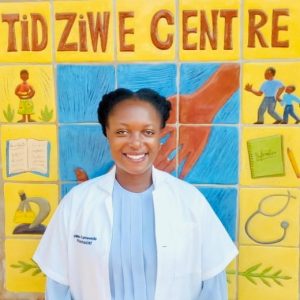November 2, 2022

The UNC Eshelman School of Pharmacy is one of five schools included in a research grant from the National Cancer Institute, part of the National Institutes of Health (NIH) for the project “Adapting a point of use test card, the chemoPAD, for protecting chemotherapy drug quality in sub-Saharan Africa.” This project is led by Professor Marya Lieberman Ph.D. at the University of Notre Dame who developed the chemoPAD technology.
This project’s goal is to validate a new technology for detecting inferior quality chemotherapy products at the point of use in four countries; Ethiopia, Malawi, Kenya, and Cameroon. These countries do not conduct post-market surveillance testing on chemotherapy products, so there is not good evidence on what percentage of the chemo drugs are adequate quality.
“The World Health Organization states that 1 in 10 essential medicines in low-income counties are substandard and falsified.” said UNC Eshelman School of Pharmacy associate professor Sachiko Ozawa, Ph.D., M.H.S. “We ran a systematic review confirming this, twice. We found that the majority of these drugs are likely substandard rather than falsified. We found that out of seven, six are likely to be substandard and one is likely to be falsified with less than 50% of the active pharmaceutical ingredient (API).”
The funding from the NIH allows for the validation of SpotCheck technology over the course of five years. Spotcheck consists of an inexpensive paper test card (the chemoPAD) and a free cell phone app. The chemoPAD will screen eight types of injectable chemotherapy drugs and the phone app will allow users to identify products that are falsified or contain less than 65% of the stated API content. This technology will make it harder for manufacturers and distributors to sell poor quality chemotherapy products. Inexpensive and reliable testing methods can act as a deterrent, where the quality of chemotherapy products used in these countries may improve over time.

On this project, the UNC Eshelman School of Pharmacy is working with UNC Project Malawi, a collaboration between the University of
North Carolina and the Malawi Ministry of Health. From Chapel Hill, Ozawa and UNC Eshelman School of Pharmacy associate professor Benyam Muluneh, PharmD., BCOP, CPP are co-leading the project, modeling, and observing the supply chain impacts of chemotherapy quality on the clinical side. From Lilongwe, UNC School of Medicine assistant professor Matthew Painschab, MD and UNC Project Malawi research pharmacist Hanna Kumwenda will test medicines using the Spotcheck technology to ensure that it can detect inferior quality chemotherapy medication before they are given to potential patients. The team will also work with Ibrahim Chikowe at the University of Malawi in Blantyre who will engineer chemoPADS for use in Malawi.
“This project gives us a collaborative avenue for UNC Eshelman School of Pharmacy to be engaged with UNC Project Malawi where our PharmD students can be involved in global health research as Global Pharmacy Scholars.” said Ozawa.

“As a co-Investigator my role is to coordinate study activities and supervise the study team to ensure the study is conducted with quality and follows the protocol, standard operating procedures, manual of procedures and any applicable guideline and regulations.” said Kumwenda.
On the ground, Kumwenda is responsible for conducting a pilot study to use chemoPADs at the site to understand how point-of-use drug screening can be best integrated into clinical workflows, personnel training, sample collection, testing, and analysis. She hopes to set up a system for long term incorporation of the chemoPAD in standard of care among other tasks.
“Through my research, I am focused on ensuring all individuals are able to benefit from safe and efficacious medications both through the provision of direct patient care services that aim to optimize treatment regimens, as well as through medication quality assurance. The goal is to ensure that all Malawians are able to benefit from safe and efficacious medications.” said Kumwenda.
The research team hopes that the NIH grant can help make a difference in medicine quality-assurance in Malawi. “This grant is very important as there is limited information surrounding the quality of chemotherapy agents utilized in Malawi given the lack of capacity to conduct appropriate quality analyses” said Kumwenda. “By piloting the implementation of the cost-effective chemoPAD technology through this project, there is an immense opportunity to ensure that all future patients in Malawi can receive high quality and efficacious chemotherapy.”
Research reported in this publication was supported by the National Cancer Institute of the National Institutes of Health under Award Number U01CA269195. The content is solely the responsibility of the authors and does not necessarily represent the official views of the National Institutes of Health.
Latest News

Dean Angela Kashuba receives Carolina Alumni Faculty Service Award

RASP poster presentations capture student research


